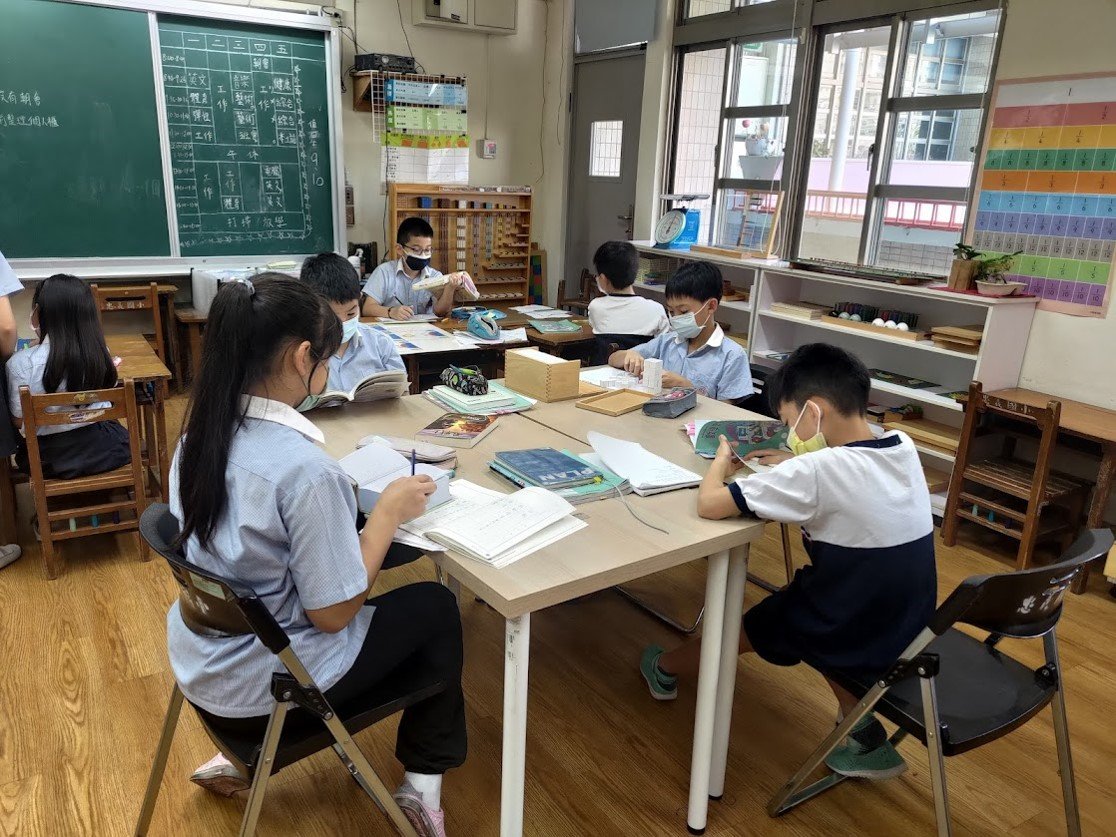Interview with Zheng-Hua Yan, Course Instructor of Montessori Elementary School Tuition-Free Teacher Training Program.
To create successful "home-school partnerships," parents need to learn and grow as well, forming partnerships with the school so that they can bring together two different perspectives as they jointly accompany the children in discovering who they are at various stages of life.
"You’re not a real Montessori teacher; you’re a fake! You can’t restrict our freedom," a third-grade boy standing in front of Zheng-Hua Yan pointed and roared like a string of blasting firecrackers.
Zheng-Hua simply looked into the angry-child’s eyes and calmly said: "Okay, just do your work." To the little boy’s surprise, the new teacher didn’t take the bait, and all he could do was murmur to himself and return to the task at hand.
Fast forward two years. The student now in front of Zheng-Hua is a polite, respectful fifth-grader who calls out "present" whenever entering the class and then bowing before leaving. The little boy’s Asperger's symptoms are barely noticeable while his natural intelligence and talents shine through.
"Perhaps trust had something to do with it!", Zheng-Hua smiles as he recalls the volatile period when the two first met.
Before Zheng-Hua came to Taipei Municipal Zhongyi Elementary School, Zhongyi was in crisis: there was talk of closing the school; parental involvement was low; the community was disadvantaged; substitute teachers’ replacement rate was high. In addition, in-person instruction was unstable due to COVID-19.
It’s not hard to imagine that the students suffered from a profound sense of insecurity. Teachers didn’t know their students well; students’ academic performance was lacking; and students were understandably defensive. Compared to the bright, cheerful, and polite students they are today, it’s like night and day.
Montessori: illusion or reality?
As a graduate of the National Dong Hwa University, Zheng-Hua has general teaching qualifications and also a certificate of special-education. However, as a rebellious youth, he’d always had difficulty fitting into the traditional education system.
"In a teacher training university, everyone is expected to follow the same career path. After graduation, they do internships and undergo evaluation to become professional teachers; it seems that's the only route for educators. I was labeled as an oddball because I didn't want to follow that path."
Recalling his college days, he was certain of one thing: "I didn't want to follow the prescribed route; I wanted to find my own self-worth!" This is why he devoted himself to education.
Before joining Zhongyi Elementary School, Zheng-Hua worked at Utopia Montessori School. He refers to himself as a "Montessori education practitioner."
That’s because many Montessori videos showcased gentle international teachers who made children feel at ease; even young children were learning in an orderly manner. "It looked too much like a well-made promotional video.
I wanted to see if it was true." To test it out, he stayed at the Utopia Montessori School for six years and came away thoroughly convinced that Montessori is the real deal.
But another doubt crept in: "That experience was at a private school. Could Montessori also work in public schools?" Consequently, when Zhongyi’s teacher Yan-Ling invited him to join in assisting the school's Montessori transformation, Zheng-Hua gladly accepted the challenge and embarked on his second stage of on-site validation.
Montessori in public schools begins with respect and self-discipline
Zheng-Hua spent a long time defining self-discipline, what it means to respect yourself and the environment around you, and the value of choosing to believe with his students. Teaching students to learn self-respect is foundational.
It is hard to imagine that an elementary school in Taipei’s Zhongzheng District, where real estate prices are sky-high, would face closure owing to insufficient enrollment.
Zhongyi Elementary School was first established in 1966, adjacent to the Nanjichang Night Market. The school building is old, and each grade level didn’t have enough students to fill one class. Fortunately, the principal was eager for change and fully supported a Montessori transformation.
Teachers who couldn't adapt were given priority to be transferred to other schools with the assistance of the municipal government. Experienced teachers willing to stay have provided solid administrative support during the school's transformation process.
When Zheng-Hua began teaching at the school during the 2019-2020 academic year, he was in no hurry to make big changes: "I first laid down some ground rules for the students to establish a system."
For example, the little boy mentioned above was a transfer student; emotionally sensitive, he would sometimes stuff himself into a storage locker and refuse to come out.
The students’ learning had been hampered by the pandemic, so Zheng-Hua didn’t push them too hard in the first half of the year and instead taught by modeling: "I spent a long time defining self-discipline, what it means to respect yourself and the environment around you, and the value of choosing to believe with my students." Teaching students to learn self- respect is foundational.
Can third-grade students grasp such abstract concepts? Zheng-Hua thinks that they might not fully comprehend them at first, but as their experiences accumulate from third to fifth grade, these concepts gradually crystalized.
"Now the sixth-grade students not part of the Montessori program notice that ‘the younger students’ disposition seem different.’"
Zheng-Hua also told the first group of third-grade students who are the first to experience the Montessori program: "You are key to this school’s transformation. The younger students will be looking to you as examples to follow."
Knowing that they’d influence those who would come after, the students’ sense of purpose came about naturally. As the upper classmen, they’ve become role models.
Making good use of the Montessori framework
Change requires strategy. Zhongyi Elementary School’s teaching team believes that the traditional 40-minute class period is not conducive to completing lessons and can easily interrupt students' learning tempo.
Leaning on joint efforts, Zhongyi overcame these difficulties, winning the support of teachers and parents alike. Now the school "has no set class periods."
According to Zheng-Hua: "I think the Montessori framework is helpful. It can loosen the rules to a certain extent. For example, without an artificially imposed 40-minute cut-off, learning can be more thorough."
The school has now adopted the Montessori time framework for grades one through five, no longer having bells to signal the beginning and end of 40-minute class periods.
What if a student needs to go to the bathroom? Zheng-Hua points to the hand drawn floorplan map at the back of the classroom, on which there are magnets marked with each student's name. Students who needs to leave the classroom simply mark their destination on the diagram, which is much like Google map on paper.
It’s apparent where anyone is at any given time. Once on the brink of closure, Zhongyi Elementary School is now flourishing thanks to the leadership of Zheng-Hua, other Montessori-trained teachers, as well as Zhongyi’s highly capable administrative staff and principal.
There were no empty seats at this year’s school open house, drawing parents and inquiries from all quarters. This positive turnout inspired all the teachers and students in the school.
Montessori education in public school is feasible!", Montessori education practitioner Zheng-Hua nodded in agreement. There’s more good news: in August 2024, Zhongyi Elementary School will formally become Taiwan’s first Montessori experimental education school for children ages 0-12.
The old campus has been given new life after refurbishment and anticipates the contribution of fresh talent with a passion for education.
Written by Yu-Hsiu Su
Images provided by Zheng-Hua Yan
Translators: Robert Fox Graduate Institute of Translation and Interpretation, NTNU


